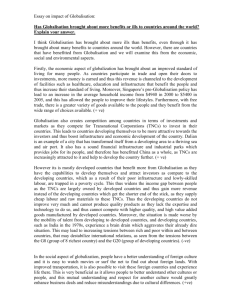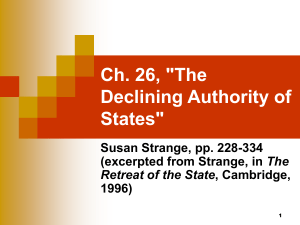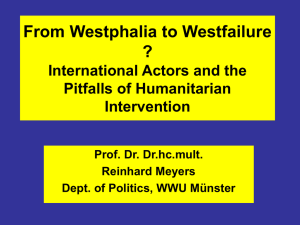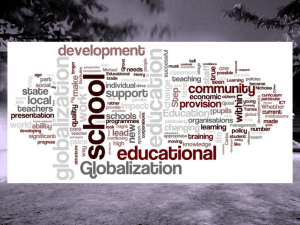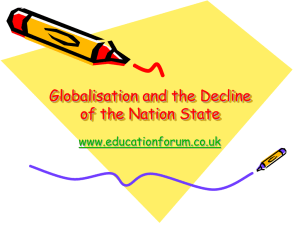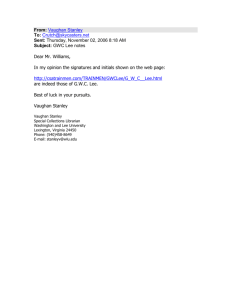“AFTER WESTPHALIA, WHITHER THE NATION STATE, ITS
advertisement
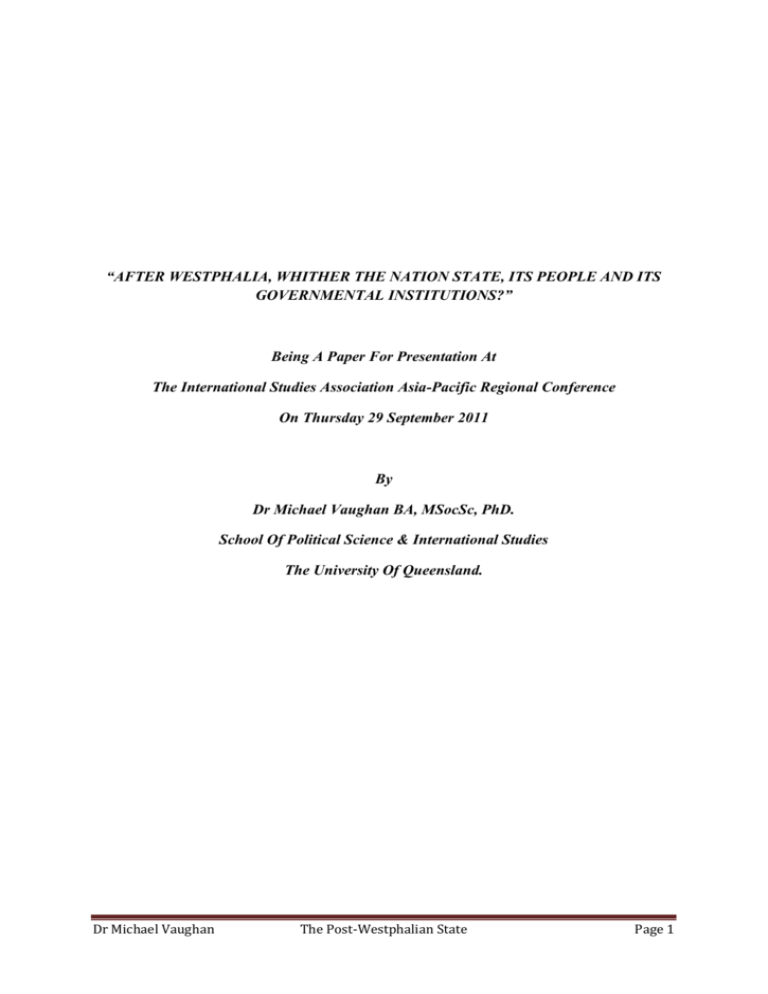
“AFTER WESTPHALIA, WHITHER THE NATION STATE, ITS PEOPLE AND ITS GOVERNMENTAL INSTITUTIONS?” Being A Paper For Presentation At The International Studies Association Asia-Pacific Regional Conference On Thursday 29 September 2011 By Dr Michael Vaughan BA, MSocSc, PhD. School Of Political Science & International Studies The University Of Queensland. Dr Michael Vaughan The Post-Westphalian State Page 1 MAP OF EUROPE AS DETERMINED BY THE PEACE OF WESTPHALIA, SIGNED ON 24 OCTOBER 1648 [Source: http://go.grolier.com/map?id=mh00046&pid=go. Accessed 30 June 2011.] Dr Michael Vaughan The Post-Westphalian State Page 2 FORMAL DOCUMENT, TREATY OF WESTPHALIA, AS SIGNED BY NEGOTIATING ENVOYS FROM CATHOLIC PRINCES AND STATES AS WELL AS PROTESTANT PRINCES AND STATES IN OCTOBER 1648 AND RATIFIED IN FEBRUARY 1649 [Source: http://www.lessing-photo.com/dispimg.asp?i=030804+9+&cl=1. Accessed 30 June 2011.] Dr Michael Vaughan The Post-Westphalian State Page 3 ABSTRACT For more than 360 years, the state system created by the Treaty of Westphalia in 1648 AD determined relations among states and their peoples. Under its terms, the devastating Thirty Years‟ War of 17th Century Europe was ended and the territorial sovereignty of the states of the Holy Roman Empire was recognised and the 300 princes of the Empire became absolute sovereigns in their own dominions. In the 21st Century, such is no longer the case, with the form of the nation-state weakening and once all-powerful governments being obliged to reluctantly share their former unrivalled dominion with Trans National Corporations (or TNCs), International Government Organisations (or IGOs) and Non Governmental Organisations (or NGOs.) This Paper examines the decline of nation-state rule and its implications for the resultant, changed international order and populations most directly affected. It concludes that the post-Westphalian state system will have a variety of potential forms and manifestations and that new political institutions and practices are needed to enable the world‟s people to cope with altered international society and to govern their own, increasingly interdependent, affairs. “The art of statesmanship is to foresee the inevitable and to expedite its occurrence.” CHARLES MAURICE DE TALLEYRAND [1754 AD – 1838 AD], French Minister and Ambassador, noted for his capacity for political survival and for his consistent policy aim of securing peace and stability in Europe. “Diplomacy is a disguised war, in which states seek to gain by barter and intrigue, by the cleverness of arts, the objectives which they would have to gain more clumsily by means of war.” RANDOLPH BOURNE [1886 AD – 1918 AD], American Journalist, Social Critic and Political Activist – a Graduate of Columbia University, who opposed United States‟ intervention in World War I. Dr Michael Vaughan The Post-Westphalian State Page 4 1. INTRODUCTION The Peace of Westphalia ended the Thirty Years‟ War, a complex struggle that began in 1618 as a religious conflict within the Holy Roman Empire between the ruling Catholic Hapsburg dynasty and their Protestant subjects in Bohemia. Over the next three decades, the war evolved through a series of phases into a wider political conflict, pitting the Austrian and Spanish branches of the Hapsburgs together with their allies among the Catholic German princes against Denmark, Sweden, France and their allies among the Protestant German princes. During the exhausting conflict, much of central Europe was devastated. At least 500,000 troops had died in combat and civilian casualties were even greater, especially in Germany where most of the fighting occurred. Some writers estimate the loss of life at almost one quarter of Germany‟s population, with others numbering such losses as constituting as much as two thirds.1 The pragmatic decisions of the Catholic delegates at Muenster and the Protestant delegates at Osnabrueck were designed to redraw the map of Europe so that a new balance of power could be established. Under the terms of the peace agreements, the power of the Hapsburgs was weakened, with the Holy Roman Empire limited in its sphere of influence to Austria and parts of Germany. France became the dominant power on the continent, and was now bordered by weak, fragmented states that posed no real threat to its security. Sweden received control of the north German coast, and the United Provinces of the Netherlands became independent of Spain.2 The philosophical decisions of the delegates centred upon rules of statecraft, designed to create a normative order that would support the new balance of power. This Westphalian order assumed a vital importance for three main reasons. First, it secularised international politics by divorcing it from any particular religious footing, anchoring it instead on the tenets of national interest 1 Raymond, Gregory A. 2005. ‘Westphalia’. In ENCYCLOPEDIA OF INTERNATIONAL RELATIONS AND GLOBAL POLITICS, ed. M. Griffiths. London: Routledge, p. 856. 2 Ibid., p. 857. Dr Michael Vaughan The Post-Westphalian State Page 5 and reasons of state. Second, it promoted sovereignty, the legal doctrine that no higher authority stands above the state, except that to which the state voluntarily assents. Third, it accepted a conception of international society based on the legal equality of states. All sovereign states possessed the same rights and duties. They had the right to manage matters within their boundaries without outside interference, as well as the duty to abstain from intervening in the domestic affairs of other states. The Peace of Westphalia overturned the medieval system of centralised religious authority and replaced it with a decentralised system of sovereign, territorial states. For some scholars, the Westphalian treaty marks the birth of the nation-state, itself the primary subject of modern international law.3 Over the past three and a half centuries, the principles and practices of the Westphalian Treaty gradually spread from Europe to the rest of the world. Increasingly, however, scholars and policymakers are asking whether they continue to be applicable in the 21st Century. Contemporary world politics is shaped by centripetal and centrifugal forces. At the same time that globalisation is pulling many of the planet‟s inhabitants together, fragmenting processes are pushing people apart. The world is simultaneously becoming more cosmopolitan and more parochial. Powerful non-state actors now vie with sovereign states. Intricate patterns of transnational exchange compete with emotional ties of national identity. Nation-states are enmeshing with complex networks of transnational governance that include corporations, banks, and intergovernmental and non-governmental organisations. In sum, the world today is being shaped by forces that challenge the Westphalian state-centric view of international politics.4 2. THE INCREASINGLY PLIABLE CONCEPT OF SOVEREIGNTY Sovereignty presupposes that the state is a territorially bounded unit with an inside and an outside. Internally, the sovereign state is conceived to be an entity that can exercise supreme authority within its own territorial boundary. Thus, a state is sovereign because it is acknowledged that there is no external organisation that can exercise authority within the territorial boundaries of that 3 4 Ibid., p. 857. Ibid., p. 858. Dr Michael Vaughan The Post-Westphalian State Page 6 state. Externally, a state must be recognised by the other sovereign states and identified as an equal member of the international society. Putting internal and external considerations together, it follows that sovereign states have an international obligation or duty to abide by the norm of non-intervention. Put differently, sovereignty requires all states to acknowledge that they have no right to intervene in each other‟s domestic affairs.5 Such orthodox and traditional interpretations, however, in the last 50 years or so, have undergone questioning, revision and readjustment. From the 1960s onwards, the potential for states to maintain their sovereign status was called into question with increasing frequency. This trend accelerated in the 1990s with the growing belief that the forces of globalisation had the capacity to erode sovereignty. As the impact of the Cold War waned, cosmopolitanism gained ground and there were persistent demands by liberal cosmopolitans on governments in the developed world to promote democratisation and to engage in humanitarian intervention at the expense of sovereign states in the Third World. Equally, at this time, there occurred a widening and deepening of the European Union, thereby threatening to undermine the sovereign state at its point of origin. For many analysts, the combination of these developments seemed to inexorably lead to the conclusion that the sovereign state is in the process of terminal decline.6 International Relations theorists, using the name „poststructuralists‟, have stressed that because men and women are no longer living in a Westphalian era, politics, sovereignty and subjectivity all need to be redefined to take account of the fact that it no longer makes sense to attempt to delineate the world in terms of distinct realms that operate inside and outside the sovereign state. At the same time, some political philosophers suggest, conversely, that the sovereign state has such a firm grip on the manner in which politics is conceived that it is very difficult to conceptualise what politics would look like in the absence of the sovereign state. For varying reasons, the principal IR Schools of thought – realists, constructivists and the English School adherents – all conclude that the idea of a Westphalian era governed by an unchanging principle of sovereignty is simply untenable.7 5 Little, Richard. 2005. ‘Sovereignty’. In ENCYCLOPEDIA OF INTERNATIONAL RELATIONS AND GLOBAL POLITICS, ed. M. Griffiths. London: Routledge, pp. 768-769. 6 Ibid., p. 769. 7 Ibid., p. 775. Dr Michael Vaughan The Post-Westphalian State Page 7 Realists acknowledge that sovereignty has never been a sacrosanct principle in either the past or the present and have little reason to believe that it will dictate the shape of international relations in the future. States, in their view, will search for and find pragmatic solutions that either violate or compromise sovereignty whilst still continuing to put forward the virtues of sovereignty. Constructivists, on the basis of theoretical and empirical insights, claim to demonstrate how state practices which define and constitute sovereignty have changed radically across the centuries. They anticipate that the nature of sovereignty will continue to be reconstituted in the future as it has also been in the past. The English School theorists chiefly focus their attention on the issue and practice of humanitarian intervention. Their perspective, buoyed up by the International Commission on Intervention and Sovereignty, is that intervention and sovereignty are not in essence mutually exclusive concepts and that there is a desperate need for the international community of states to accept that they have a responsibility to intervene – although under clearly specified circumstances – in order to protect human life. All three theoretical perspectives assume that sovereignty will continue to be a defining feature of international relations.8 3. THE CHANGING NATURE OF THE NATION STATE The increasing importance of the global economy and global interdependence, combined with the heightened power of domestic interests, have forced developed states to abandon territorial expansion and military conquest as means of accumulating relative gains. Instead these trading states have concentrated on increasing their share of the world economy. Only states whose economic output is based on the production of goods from land seem to retain territorial ambition. But in states where capital, labour and technology are mobile, and where they dominate the economy, the urge to increase the market share has supplanted that of territorial acquisition.9 For most of the 20th Century, trade was the primary means whereby the international economy was integrated. Beginning in the 1960s, the emergence of multinational corporations (MNCs) accelerated the rise of the trading state by internationalising the means of production. Increasingly, however, transnational networks have replaced MNCs as the mode of organisation of international 8 Ibid., pp. 775-776. Lansford, Tom. 2000. ‘Post-Westphalian Europe? Sovereignty and the Modern Nation-State’, INTERNATIONAL STUDIES 37(1): 11. 9 Dr Michael Vaughan The Post-Westphalian State Page 8 trade. These networks are based on collective action. One no longer tries to gain at the expense of other actors. The urge to pursue individualistic gain has been replaced by the quest for collective gain. The gains from the development of such networks have come at the cost of the autonomy of states. As Keohane and Nye point out, “ From the foreign-policy standpoint, the problem facing individual governments is how to benefit from international exchange while maintaining as much autonomy as possible.” As these states compete to acquire relative gains, the global economic system confronts a problem: how can the international system “... generate and maintain a mutually beneficial pattern of cooperation in the face of competing efforts by governments (and nongovernmental actors) to manipulate the system for their own benefit?” 10 In the post-World War II era, nation-states have been effectively curbed in their individualistic pursuit of goals and payoffs by the proliferation of International Organisations and regimes and the internalisation of international norms and rules by domestic societies. The modern nation-state has undergone significant changes both in terms of its purpose and sovereignty. States have traditionally been based on territorial factors. Increasingly, however, state participation in the global economy has led to the former‟s integration with the latter and, consequently, an increased degree of interdependence among states. The result has been the rise of trading states which measure themselves by their relative shares of the global economy and not by territorial size or military power. 11 [SEE NEXT PAGE FOR INTERNATIONAL MONETARY FUND PIE GRAPH OF WORLD ECONOMY SHARES FOR THE YEAR 2000.] 10 nd Keohane and Nye, eds. 1989. POWER AND INTERDEPENDENCE, 2 Ed. Glenview Ill, cited in Lansford 2000: p. 12. 11 Lansford, Ibid., p. 14. Dr Michael Vaughan The Post-Westphalian State Page 9 [Source: http://www.budget.gov.nl.ca/budget2000/economy/images/Share of World Economy.JPG Accessed 30 June 2011.] 4. ADDITIONAL PLAYERS IN THE FIELD – NGOs & TNCs Non Governmental Organisations (NGOs) are private voluntary organisations whose members are individuals or associations that come together to achieve a common purpose. Some organisations are formed to advocate a particular cause such as human rights, peace and environmental protection; while others are established to provide services such as disaster relief, humanitarian aid or development assistance, especially in war-torn societies.12 12 IPM ENCYCLOPEDIA, The Hague University, 2008-2009. http://wiki.triastelematica.org./index.php./Draft:Non-Governmental_Organizations Accessed 30 June 2011. Dr Michael Vaughan The Post-Westphalian State Page 10 The number of cross-national groups (e.g. Medecins Sans Frontieres and Amnesty International) was estimated at 40,000 in 2001, but is likely higher today in 2011. 13 The growth of non-state actors has in large part been fuelled by the perceived inability of both domestic and international institutions to respond to the social, economic and political consequences of rapid advances in science and technology, growing economic interdependence and political fragmentation. In addition, a growing number of transnational threats (pandemics, global warming and the proliferation of Weapons of Mass Destruction) that require a coordinated response have created a need for new partners and approaches in solving global issues. 14 The following Table demonstrates well the kind of political activity that is undertaken by NGOs, making them influential participants in the practices and forms of state rule. NGO GOVERNANCE FUNCTIONS Perform functions of governance in absence of state authority Gather and publicise information Create and mobilise networks Frame issues for public consumption Promote new norms Advocate changes in policies and governance Monitor human rights and environmental norms Participate in global conferences Enhance public participation Distribute humanitarian aid Implement development projects [Source: IPM Encyclopedia, The Hague University, 2008-2009. http://www.wiki.triastelematica.org/index.php./Draft:NonGovernmental_Organizations. Accessed 30 June 2011.] A Transnational Corporation (TNC) differs from a traditional Multinational Corporation (MNC) in that it does not identify itself with one single national home. Whilst traditional MNCs are national companies with foreign subsidiaries, TNCs spread out their operations in many countries, sustaining 13 ‘Non-Governmental Organisation’, NEW WORLD ENCYCLOPEDIA.http://www.newworldencyclopedia.org/entry/Non-governmental_organization Accessed 30 June 2011. 14 McGann, James and Mary Johnstone. 2006. ‘The Power Shift and the NGO Credibility Crisis’. THE INTERNATIONAL JOURNAL OF NOT-FOR-PROFIT-LAW 8(1): Page References Lacking. Dr Michael Vaughan The Post-Westphalian State Page 11 high levels of local responsiveness. The two terms, though, can be used interchangeably. A transnational, or multinational, corporation has its headquarters in one country and operates wholly or partially owned subsidiaries in one or more other countries. The subsidiaries report to the central headquarters. The growth in the number and size of TNCs since the 1950s has generated controversy because of their economic and political power and the mobility and complexity of their operations. Some critics argue that TNCs exhibit no loyalty to the countries in which they are incorporated but act solely in their own best interests.15 Many TNCs today have far more power than the nation-states across whose borders they operate. For example, the combined revenues of just General Motors and Ford – the two largest motor vehicle corporations in the world – exceed the combined GDP for all of Sub-Saharan Africa. The combined sales of Mitsubishi, Mitsui, ITOCHU, Sumitomo, Marubeni and Nissho Iwai – Japan‟s top six „Sogo Sosha‟, or trading companies – are nearly equivalent to the combined GDP of all of South America. Overall, 51 of the largest 100 economies in the world are corporations. In this context of financial and economic dominion, TNCs hold 90% of all technology and product patents world-wide and are involved in 70% of world trade. More than 30% of this trade is „intra-firm‟, that is, it occurs between units of the same corporation. The number of TNCs in the world jumped from 7,000 in 1970 to 40,000 in 1995. While global in reach, these corporations‟ home bases are concentrated in the Northern Hemispherical industrialised countries, where 90% of all transnationals are based. More than half of these come from just five nations – France, Germany, the Netherlands, Japan and the United States. 16 Despite their growing numbers, power in these corporations is concentrated at the top, that is, the 300 largest corporations account for one quarter of the world’s productive assets. TNCs have the potential capacity to circumvent national governments. The borders and regulatory agencies of many governments are being affected by globalisation, conceivably allowing corporations to assume an ever more stateless quality, leaving them less and less accountable to any government anywhere. 17 15 ‘Transnational Corporation’. THE FREE DICTIONARY. http://encyclopedia.thefreedictionary.com/transnation+corporation Accessed 30 June 2011. 16 Ward, Daniel Sewell. 2003. ‘Transnational Corporations’. LIBRARY OF HALEXANDRIA.http://www.halexandria.org/dward318.htm Accessed 1 July 2011. 17 Ibid. Dr Michael Vaughan The Post-Westphalian State Page 12 Dr Michael Vaughan The Post-Westphalian State Page 13 The above Table 18 serves to illustrate the revenues, profits and respective international rankings of the top 100 corporations from the Global 500 List for 2008, as depicted by Fortune Magazine on 21 July that year. The following Table lists, in order, the 10 most profitable corporations for 2008, based on the Fortune Magazine Table on the preceding page. CORPORATION PROFIT (US$ MILLIONS) 40,610 Exxon Mobil 31,331 Royal Dutch Shell 22,208 General Electric 20,845 BP 19,269 Gazprom 19,133 HSBC Holdings 18,688 Chevron 15,365 J P Morgan Chase & Co 15,042 Toyota Motor 14,982 Bank of America Corp [Source: Transnational Corporations 2008 http://globalpolicy.org/component/content/article/221-transnationalcorporations.html. Accessed 1 July 2011. Profit Figures and Names of Corporations have been extracted from the original 2008 Data.] Analysis of the above Table shows that the combined profits for these 10 most gainful corporations in 2008 amounted to US$217.5 billion. Five of the 10 corporations were American – receiving US$111.9 billion or 51.4% of the combined profits – whilst the remaining five corporations, in order of profits, were Dutch (14.4% of combined profits); British (9.6% of combined profits); Russian (8.9% of combined profits); Hong Kong Chinese (8.8% of combined profits); and Japanese (6.9% of combined profits.) In terms of the industries carried out by the 10 corporations, five involved the exploration, refining and marketing of petroleum and petroleum products; three involved banking and financial services; one involved the design, manufacture and marketing of electrical goods and appliances; and one involved the design, manufacture and marketing of motor vehicles. 18 See ‘Transnational Corporations’ http://www.globalpolicy.org/component/content/article/221transnational-corporations.html Accessed 1 July 2011. Dr Michael Vaughan The Post-Westphalian State Page 14 In terms of government spending and the relative size of such profits, the earnings of the five US corporations for 2008 – some US$111.9 billion – amounted to the equivalent of 43 % of US government spending on interest on the national debt for 2008; or, 77% of US government spending on the global war on terror for 2008; or, 199.8% of spending on the US Department of Education for 2008. In terms of government spending and the relative size of Gazprom‟s profit for 2008 – some US$19.3 billion – this figure equates to being 7% of the total Russian budget of US$278.6 billion for 2008; or, 10.7% of Russia‟s trade surplus for 2008; or, 48.3% of Russia‟s defence budget for 2008; or, 58.7% of Russia‟s government spending on Education in 2008. IDEALISM PHILOSOPHERS John Locke Immanuel Kant Thomas Jefferson LEADING Woodrow Wilson POLITICAL Jean Monnet FIGURES Willy Brandt REALISM Thomas Hobbes Alexander Hamilton Lord Palmerston Otto von Bismarck Henry Kissinger Westphalian WORLD ORDER Free Trade, Functional system of nationPARADIGMS Integration, states, Interdependence, International Multilateralism, relations as Ecological choice between Responsibility, diplomacy or Prevention of new war, “Balance of types of security Power”, risks “Realpolitik”, Multipolarity AGGRESSIVE FUSION Machiavelli Leo Strauss Robespierre Karl Marx Paul Wolfowitz Robert Kagan Global expansion of national, ideological and cultural patterns of society (even democracy) by all means, including violence and manipulative cunning or subterfuge [Source: International Policy Analysis, http://policyanalysis.wordpress.com/category/functional-integration/ Accessed 2 July 2011.] Dr Michael Vaughan The Post-Westphalian State Page 15 The above Table outlines a taxonomy of the philosophical origins, political activists and governing paradigms of international relations theory and practice since the 18th Century Enlightenment Period to the Post-Cold War Period of the 20th and 21st Centuries. 5. AFTER WESTPHALIA – QUO VADIS? A number of authors have speculated about the possible directions of statecraft, diplomacy and governance in an era that has moved beyond the dominant paradigm of international relations of the mid 17th Century - the Westphalian order – with governments hesitantly and gingerly making their way towards newer, untried practices – involving such competitors for power as TNCs and NGOs, borderless states and religiously-based international terrorist security threats – in the early 21st Century. History teaches and demonstrates that power structures, no matter how long-lived, are never immutable and that, slowly or rapidly, such structures change, metamorphose or disappear altogether. The Greek Empire of Alexander the Great ended; as did the Persian Empire; the Roman Empire; the Mongol Empire; the Holy Roman Empire; and the British Empire. Power, although always forceful, is never the exclusively permanent acquisition of any state or group of states. The most recent instance of massive political change is the end of the Cold War in 1989, with the collapse of the former Soviet Union, the re-emergence of independent East European states and the re-unification of the most powerful state in Western Europe, Germany, so long divided between the liberal free market democratic West and the repressive state dominated communist East. Regarding change, John Locke [1632 AD – 1704 AD], the English Philosopher, Physician and Father of Liberalism, remarked “Things of this world are in so constant a flux, that nothing remains long in the same state.” Subsequently, Edmund Burke [1729 AD – 1797 AD], the Anglo-Irish Statesman, Political Theorist and Orator, observed “A State without the means of some change is without the means of its conservation.” Regarding power, Henrick Ibsen [1828 AD – 1906 AD], the Norwegian Playwright, Theatre Director and Poet, commented “The great secret of power is never to will to do more than you can accomplish.” Later, Woodrow T. Wilson [1856 AD – 1924 AD], the 28th President of the United States, said of his vision for a better world order Dr Michael Vaughan The Post-Westphalian State Page 16 following the carnage of World War I, “There must be, not a balance of power, but a community of power, not organised rivalries, but an organised peace.” It is possible to draw numerous insights and parallels from these adages and apply them to the post-Westphalian situation. First, all things are subject to change. Second, any system of statecraft must have the means to adapt itself to altered circumstances or else fall apart. Third, political power can only successfully implement what it is capable of undertaking. Fourth, diplomacy is most effective when it espouses acceptable universal principles that can be generally adopted, not when it consists largely of the narrow interests of individual states acting unilaterally. The process of globalisation, it can be argued, is now the most important development in world affairs. It marks the end of the world order dominated by nation states (or countries) and the beginning of an era in which national governments have to share their power with other entities, most notably transnational corporations, intergovernmental organisations and nongovernmental organisations. 19 The term „globalisation‟ has been used to indicate challenges for traditional nation state based models of democracy. Free trade challenges the welfare state model of tempered capitalism. Social globalisation brings about a fragmentation of social groups and identities. New political institutions, some authors claim, are needed to address the greatly diminished power of nation states and changing forms of political communities.20 Terror attacks, the newest threat to state security, have not yet become globalised and even display signs of localisation since the 1990s. Globalisation itself has not significantly connected, positively or negatively, with transnational terror attack trends. 21 Whilst there has been much theorising about what forms a post-Westphalian world order might take, Suter has put forward four cogent future possibilities – first, a continuation of the current order („Steady State‟); second, greater international cooperation through a strengthened United Nations („World State‟); third, a continued decline of national governments with economies being run by transnational corporations („Earth Inc.‟); and fourth, a breakdown 19 Suter, Keith.2003. ‘Globalisation: A Long Term View’. MEDICINE, CONFLICT & SURVIVAL 19(2): 94-106. Della Porta, Donatella. 2005. ‘Globalisation and Democracy’. DEMOCRATIZATION 12(5): 668-685. 21 Goldman, Ogen. 2011. ‘The Globalisation of Terror Attacks’ TERRORISM & POLITICAL VIOLENCE 23(1): 31-59. 20 Dr Michael Vaughan The Post-Westphalian State Page 17 of nation states and of transnational corporations resulting in national and international chaos („Wild State.‟) 22 Upon reflection, each of the four predictions is capable of realisation, though one would hope that rationality would prevail amongst decision makers – whether in government, commerce or community agencies – who would act to preserve human society and the means by which it is supported. Commentators remark that it is fair to say that states now share more power with non-state actors than at any other time in history. International relations have become, in their view, „two-pronged‟: not just state-to-state, but between states on the one hand and sub-national and supra-national actors on the other. 23 While the nation-state is far from finished, there is good reason to doubt that states hold the monopoly power within the politics of globalisation. 24 Interactions across national boundaries are now thought to be highly complex and involve an enlarged group of actors, including nation-states, subnational governments, quasi-governmental organisations and an array of private and non-profit organisations. This enlarged group is directly involved in crossborder relationships and may, in the eyes of some, even undermine the traditional approach to international relations and the sovereignty of nations. 25 Considerations of diplomacy and state sovereignty aside for a moment, the matters of globalisation, economic inequality among states and of corporate social responsibility (or CSR) by TNCs need to be examined. Mathematical empirically based studies imply that if international institutions are to reduce the inequality among nations, they should follow policies other than the variety of globalisation they have been advocating and promoting around the globe hitherto . In particular, the expansion of trade through liberal policies and the growth of international capital flows based on private incentives, even when they result in resource transfers reflected in current account deficits, appear to have increased inequality among nations. Poor countries should be allowed to pursue more interventionist trade and capital flow policies – which are more likely to bring benefits from globalisation and should facilitate more assertively 22 Suter, Keith. 2008. ‘The Future of the Nation State in an Era of Globalisation’. MEDICINE, CONFLICT & SURVIVAL 24(3): 201-218. 23 Haass, Richard N. 2005. ‘The Politics of Power’ HARVARD INTERNATIONAL REVIEW 27(2): 61-62. 24 Holton, Robert J. 1998. GLOBALISATION AND THE NATION STATE. New York: St Martin’s; Cited in Brinkman, Richard L. And June E. Brinkman. 2008. ‘Globalisation and the Nation State: Dead or Alive’ JOURNAL OF ECONOMIC ISSUES 42(2); 431. 25 Mingus, Matthew S. 2006. ‘Transnationalism and Subnational Paradiplomacy: Are Governance Networks Perforating Sovereignty?’ INTERNATIONAL JOURNAL OF PUBLIC ADMINISTRATION 29(8): 587. Dr Michael Vaughan The Post-Westphalian State Page 18 the transfer of appropriate technology from rich to poor countries.26 Concerning the desirable practice of corporate social responsibility, it is apparent that only a small percentage of the world‟s 70,000 TNCs, 700,000 affiliates and millions of suppliers have thus far seriously embraced CSR. While the range of issues addressed under company codes of conduct, for example, has expanded, procedures related to actual implementation are often under-developed.27 The behaviour of nation-states and of the transnational organisations within them raise the question of the nature of the Westphalian system and its derivative effect on contemporary international diplomacy and state-centred conduct. Critics claim that the Westphalian system was merely an interlude, if it even existed at all, between international dominance by powerful empires or institutions. They can be said to be correct in their assertions that there is far less of a power balance in contemporary international relations than in previous centuries. Yet, criticism of the Westphalian system fails to recognise that sovereign states always act in their own interests. Consider the case of France and Germany‟s refusal to support the United States in the Second Iraq War. Both countries, as members of NATO, are allies of the United States, but they are also sovereign states, obligated primarily to their citizenries‟ best interest. 28 Although diminished, the capacity of modern nation-states to pursue their own priorities, even at the risk of isolating a major ally, is still present and capable of activation, given specific and exceptional circumstances. In conclusion, one might reflect on perhaps one of the greatest calamities that can befall any nation-state, regardless of its size and influence, the dreaded occurrence of regime failure and collapse. A state is usually considered to have failed when the power structures providing political support for law and order have comprehensively broken down. This process is generally triggered and accompanied by anarchic forms of widespread internal violence. Examples of such states have included Somalia, Liberia, Sierra Leone, Bosnia-Herzegovina, Rwanda, Sudan, Lebanon and Congo.29 The fatal characteristics of failed states appear in the taxonomy immediately below, based on Thuerer‟s work. 26 Dutt, Amitava Krishna and Kaja Mukhopadhyay. 2009. ‘International Institutions, Globalisation and the Inequality among Nations’ PROGRESS IN DEVELOPMENT STUDIES 9(3): 332, 336. 27 Utting, Peter. 2007. ‘CSR and Equality’, THIRD WORLD QUARTERLY 28(4): 700. 28 Farr, Jason. 2005. ‘Point: The Westphalia Legacy and the Modern Nation-State’ INTERNATIONAL SOCIAL SCIENCE REVIEW 80(3&4): 158. 29 Thuerer, Daniel. 2008. ‘An Internal Challenge’ HARVARD INTERNATIONAL REVIEW 29(4): 42. Dr Michael Vaughan The Post-Westphalian State Page 19 RELEVANT FACTOR SOCIAL ECONOMIC POLITICAL INDICATORS Mounting demographic pressures Massive movement of refugees or internally displaced persons creating complex humanitarian emergencies Legacy of vengeance-seeking group grievance or paranoia Chronic and sustained human flight Uneven economic development along group lines Sharp and/or severe economic decline Criminalisation and/or delegitimisation of the state Progressive deterioration of vital public services Suspension or arbitrary application of the rule of law and widespread violation of human rights Operation of security apparatus as a non-accountable ‘state within a state’ Rise of factionalised and competing elites Intervention by other states or by external political actors [Source: “Indicators of Failed States”, Daniel Thuerer. 2008. „An Internal Challenge.‟ Harvard International Review 29(4): 45.] Dr Michael Vaughan The Post-Westphalian State Page 20 REFERENCE LIST Brinkman, Richard L. and June E. Brinkman. 2008. „Globalisation and the Nation State: Dead or Alive‟. Journal of Economic Issues 42(2): 425-433. Della Porta, Donatella. 2005. „Globalisation and Democracy‟. Democratization 12(5): 668-685. Dutt, Amitava Krishna and Kaja Mukhopadhyay. 2009. „International Institutions, Globalisation and the Inequality among Nations‟. Progress In Development Studies 9(4): 323-337. Farr, Jason. 2005. „Point: The Westphalia Legacy and the Modern Nation State‟. International Social Science Review 80(3&4): 156-159. Goldman, Ogen. 2011. „The Globalisation of Terror Attacks‟. Terrorism & Political Violence 23(1): 31-59. Haass, Richard N. 2005. „The Politics of Power‟. Harvard International Review 27(2): 60-65. International Policy Analysis. Accessed 2 July 2011. Available at http://policyanalysis.wordpress.com/category/functional-integration/ IPM Encyclopedia. 2008-2009. The Hague University. Accessed 30 June 2011. Available at http://wiki.triastelematica.org/index.php/Draft:NonGovernmental_Organizations. Keohane, Robert O. and Joseph S. Nye, eds. c1989. Power and Interdependence, 2nd ed. Glenview, Ill: Scott, Foresman. Lansford, Tom. 2000. „Post-Westphalian Europe? Sovereignty and the Modern Nation-State‟. International Studies 37(1): 1-15. Little, Richard. 2005. „Sovereignty‟. In Encyclopedia of International Relations & Global Politics, ed. M. Griffiths. London: Routledge. McGann, James and Mary Johnstone. 2006. „The Power Shift and the NGO Credibility Crisis‟. The International Journal of Not-For-Profit-Law 8(1): Page References Lacking. Dr Michael Vaughan The Post-Westphalian State Page 21 Mingus, Matthew S. 2006. „Transnationalism and Subnational Paradiplomacy: Are Governance Networks Perforating Sovereignty?‟ International Journal of Public Administration 29(8): 577-594. New World Encyclopedia. Non-Governmental Organization. Accessed 30 June 2011. Available at http://www.newworldencyclopedia.org/entry/Nongovernmental_organization. Raymond, Gregory A. 2005. „Westphalia‟. In Encyclopedia of International Relations & Global Politics, ed. M. Griffiths. London: Routledge. Share of World Economy. Accessed 30 June 2011. Available at http://www.budget.gov.nl.ca/budget2000/economy/images/Share of World Economy.JPG. Suter, Keith. 2003. „Globalisation: A Long Term View‟. Medicine, Conflict & Survival 19(2): 94-106. Suter, Keith. 2008. „The Future of the Nation State in an Era of Globalisation‟. Medicine, Conflict & Survival 24(3): 201-218. The Free Dictionary. Transnational Corporation. Accessed 30 June 2011. Available at http://encyclopedia.thefreedictionary.com/transnation+corporation. Thuerer, Daniel. 2008. „An Internal Challenge‟. Harvard International Review 29(4): 42-45. Transnational Corporations. Accessed 1 July 2011. Available at http://www.globalpolicy.org/component/content/article/221-transnationalcorporations.html. Utting, Peter. 2007. „CSR and Equality‟. Third World Quarterly 28(4): 697-712. Ward, Daniel Sewell. 2003. Transnational Corporations. Accessed 1 July 2011. Available at http://www.halexandria.org/dward318.htm. Dr Michael Vaughan The Post-Westphalian State Page 22

